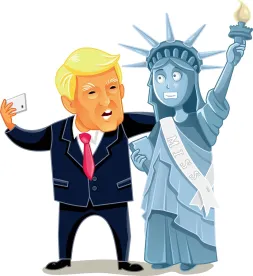On April 18, 2017, President Donald Trump signed an executive order (EO), “Buy American and Hire American,” which aims to “stimulate economic growth” and “ensure the integrity of the immigration system.” Although this action provides impetus to federal agencies to propose changes to the U.S. immigration system, the EO itself does not present an immediate impact to immigration programs.
Section 5 of the EO, “Ensuring the Integrity of the Immigration System in Order to ‘Hire American’,” instructs the Secretaries of State, Labor, and Homeland Security, as well as the Attorney General, to “propose new rules and issue new guidance” but leaves it up to the various agencies to craft the specific policies and regulations that will be required to give eventual shape and effect to the EO’s more general call for an overhaul of the current system. Focusing specifically on the H-1B visa program, the EO instructs these agencies to suggest reforms “to help ensure that H-1B visas are awarded to the most-skilled or highest-paid petition beneficiaries,” without providing additional guidance. Despite the lack of more concrete direction in the EO, previous statements from the administration have indicated that preferring workers with U.S. degrees and raising application filing fees are among the reforms being considered. Additionally, while the “Buy American” portion of the order provides time frames by which agencies must comply with each directive, the “Hire American” portion does not contain any time frames, stating instead that such reform suggestions should be presented “as soon as practicable.”
Upon announcing the EO, the president criticized the “totally random lottery” by which H-1B visas are awarded, suggesting that this will be a key focus of possible reforms. Significant changes to the H-1B program, however, would likely require legislation or regulation, and, there is, a substantial period of time between when administrative or legislative changes are announced, and when they are implemented (if at all). In light of this time frame, employers can expect the current rules governing employment-based immigration visa programs to remain in effect for at least the next several months. Of particular note, processing of H-1B petitions under the annual quota (i.e., the H-1B cap) will proceed unaffected. Although some changes to immigration programs can be expected in time, the legislative and regulatory processes should afford employers time to assess any changes and take steps to mitigate or eliminate potential impacts to their workforces.




 />i
/>i
